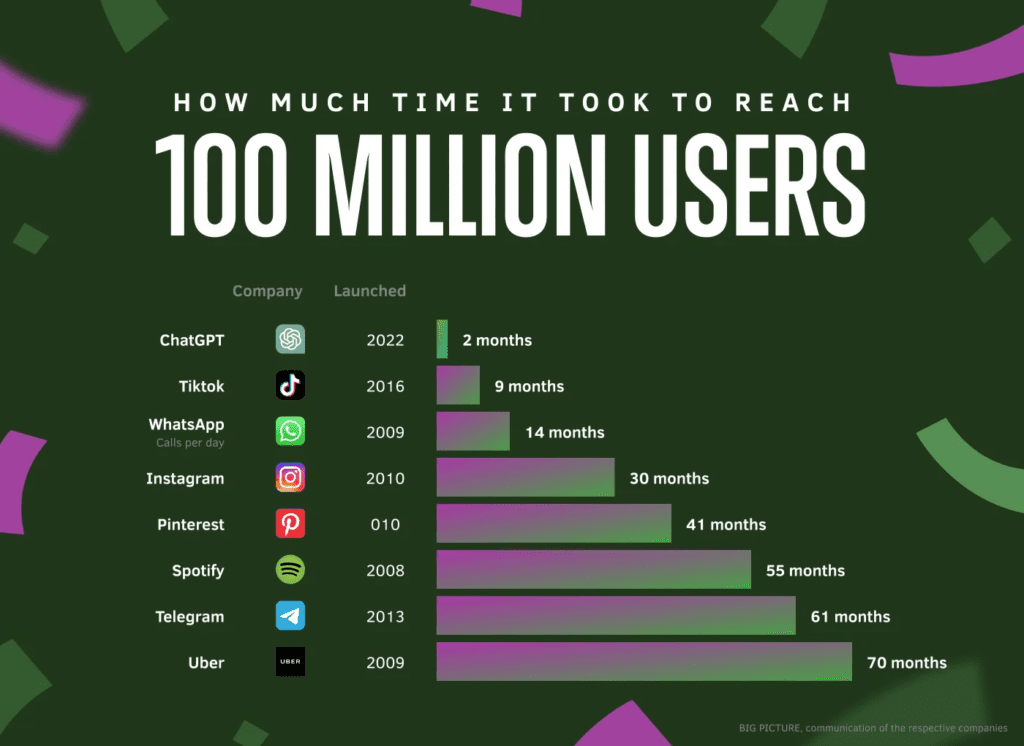Transcending waves of change
Are you ready for the big one?
Friday, April 14, 2023
I can still recall a top ad agency in San Francisco asking me to consult with their execs on how the Internet might be applied for their clients in the early 2000s.
This might seem laughable now, but as someone who was around before the floppy disk, the internet was an unparalleled breakthrough. It’s fun to look back at these waves of change, but seeing how rapidly society acclimates to new technology is eye-opening. Things are accelerating, as shown below, with how long some popular platforms took to reach 100 million users.

Source: The ChatGPT list of lists: A collection of 3000+ prompts, examples, use-cases, tools, APIs, extensions, fails, and other resources. Maximilian Vogel Feb 7, 2023
Gmail reached the 100 million user mark in 10 years. Netflix hit that number in 5 years. TikTok was able to do it in 9 months. And the most significant tech today, AI’s ChatGPT, hit that mark in only two months.
As we see with the lightning adoption of ChatGPT, we can surmise that AI is here to stay. Everyone in every industry and every business will be affected—with massive implications. We recognize that there are no boundaries to where it can apply, but ultimately it is a tool—something to be explored.
It begs some questions for all of us to ponder:
How can I leverage AI?
It’s important to remember that AI as a whole isn’t ultimately brand new. We’ve been using AI regularly for over 10 years with Spotify playlist recommendations, voice assistants, and some features of Photoshop, to name a few examples. These forms of AI are embedded in how we enact our daily routines.
Generative AI(1) is the next step in AI progression. By looking at the probability of a given set of words, it uses them to predict and generate the next set of words based on billions and billions of different data points—practically in no time. Due to the swift nature of how generative AI is evolving, those who are thinking through it and experimenting with it will be ready to respond better than those who don’t. ChatGPT is one use case, and it only clues us in on how big generative AI, as a whole, is going to be.
What can we expect with the generative AI revolution?
1. Strategy is essential
You need a strategy that helps you decide how generative AI can be used for your objectives. It’s not that you need to know how AI works. But you need to know how to work with it. Bring together your teams to discuss, explore, experiment, and practice using generative AI. Know your organization’s capabilities, resources, and appetite for risk, and constantly evaluate your competition. Set metrics for your actions to evaluate outcomes.
2. Input is everything
Your output is only as good as your input. When it comes to how AI can serve your needs, it’s important to remember that your results are only as good as your data. Is your data the most objective it can be? Are there blind spots that your data isn’t accounting for? Focusing on the quality of your input for AI is the key to harnessing the power this tool affords you.
3. AI is not the boss
There’s a lot of discourse right now about the future implications of AI. When we look at the capabilities of AI, it’s important to realize that the technology on its own is not inherently good or bad. It’s like the saying—a knife in one person’s hand can be a weapon, but a knife in someone else’s hands can heal. The human capacity to set value, apply instinct, and experiment will continue to play a massive role in making generative AI work meaningfully. It’s the human that makes the query.
“It’s the human that makes the query.”
As an old-timer in business, I’ve seen many waves of transformation that have left me in awe of what we can do as humans.
But generative AI is no ordinary wave, dear friends—it’s a tsunami. Are you ready for it?
Do you allow yourself just to get swept away into obsolescence or insignificance?
Or are you now setting your sights on higher ground?
Are you brave enough to surf on it and have the most significant ride of your life?
Generative AI is coming—actually, let’s be honest, it’s already here.
Footnote:
(1) Generative AI is a category of AI algorithms that generate new outputs based on the data they have been trained on. Unlike traditional AI systems designed to recognize patterns and make predictions, generative AI creates new content in images, text, audio, etc. Generative pre-trained transformers (GPT) are a family of language models, developed by OpenAI, generally trained on a large body of text data such that they can generate human-like text. They are built using several blocks of what is known as transformer architecture.


